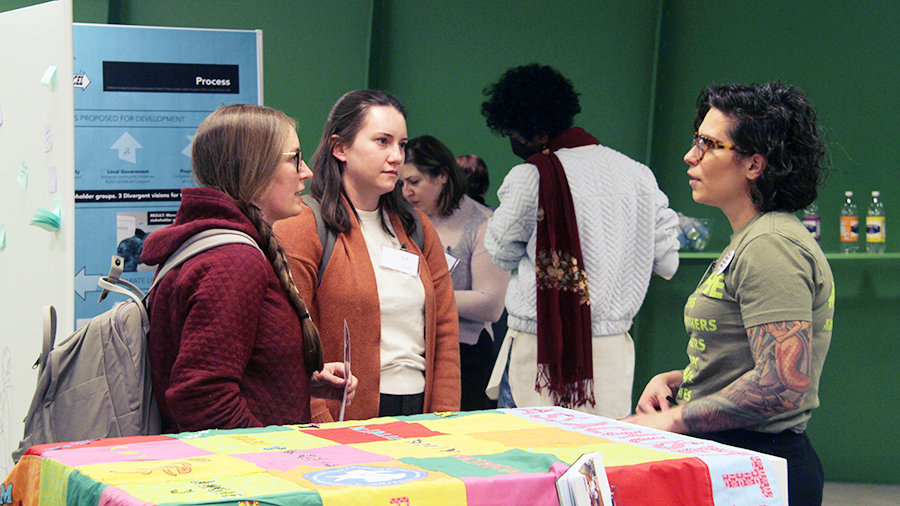Tent, Quilt, Passion: RFI Open House Finalists Showcase Their Projects

At last Wednesday’s dynamic Open House, the Boston Society for Architecture (BSA) gathered community groups, architects, philanthropists, and the general public to showcase the five finalist projects of the BSA's inaugural Request for Innovation (RFI) process—and to invite attendees and the community to support the projects' next stages.
More than 80 attendees gathered for an inspirational Open House at the BSA on March 1 to hear presentations from the leads of five projects selected as finalists in the BSA’s RFI process. Each project addresses ideas for evolving the practice of architecture to address climate and equity challenges in the built environment. During the evening, each group presented its concept and also hosted a station, at which attendees could get a window into their proposed project and talk with those who would be involved in executing the team’s vision.
"The five selected respondents represented a wonderful balance of what innovation in architecture—and thus the future of architecture—could look like," said attendee Kimberly D. Lucas, PhD, Professor of the Practice in Public Policy and Economic Justice at Northeastern University's School of Public Policy and Urban Affairs. "From something more traditional, but needed, like examining metrics of equity and considering a potential foundation for a professional certificate in equity, to the more radical, like considering the ethics and equity in practice of what projects architects don’t or shouldn’t work on in homelessness or prisons, [the projects] really demonstrate the breadth of what the profession is and could be."
Leaders from each of the five projects shared a brief talk and visual presentation:
- A civic design firm founder and a transit nonprofit director outlined a proposed social equity framework, envisioning a certification system that would incorporate social equity considerations and direct community contributions into urban design projects.
- Replete with a symbolic tent, civic activists behind the See You in the Future project proposed engaging the Mass Cass community in programming and storytelling to create healing and caring spaces in the Mass Cass neighborhood – a neighborhood that has experienced stigmatization and injustice among its unhoused and substance-dependent populations.
- Sharing a beautiful quilt made by women who had been incarcerated, the Families for Justice project proposed transcending jails to develop safe, welcoming spaces in neighborhoods for those who were formerly incarcerated.
- A team of architects proposed reforming and streamlining the approval process for large development projects that are subject to extensive zoning review under Boston's Article 80. Their proposed process aims to ensure transparency, fairness, and dedication to health, equity, and climate priorities with respect to community benefit commitments that are made when zoning approval is granted.
- Fostering circular economies—focused on reusing and regenerating materials—forms the crux of a proposal from a team of representatives from architecture, construction, and recycling firms. Their project focuses on affordable housing tenant fitouts and retrofits, and concentrates on operations with the largest generation of waste and the greatest need for reconstruction.
A summary booklet of the winning projects was shared at the event and is now available for download.
The BSA is now evaluating project needs in greater detail and determining specific resources that the BSA, its members, and its networks can apply to the selected projects. Next steps on specific projects will be defined by mid-April.
Those interested in supporting these projects in any capacity—contributions of time, labor, expertise, funding, gifts in kind, etc.—are encouraged to contact the BSA directly at [email protected] or complete this brief survey.

